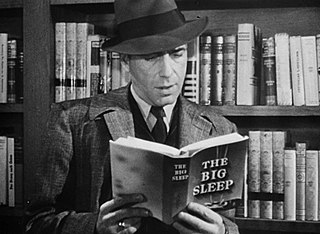
Philip Marlowe is a fictional character created by Raymond Chandler who was characteristic of the hardboiled crime fiction genre. The genre originated in the 1920s, notably in Black Mask magazine, in which Dashiell Hammett's The Continental Op and Sam Spade first appeared. Marlowe first appeared under that name in The Big Sleep, published in 1939. Chandler's early short stories, published in pulp magazines such as Black Mask and Dime Detective, featured similar characters with names like "Carmady" and "John Dalmas", starting in 1933.
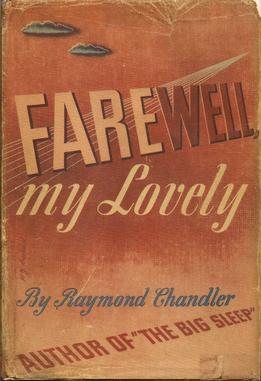
Farewell, My Lovely is a novel by Raymond Chandler, published in 1940, the second novel he wrote featuring the Los Angeles private eye Philip Marlowe. It was adapted for the screen three times and was also adapted for the stage and radio.

George Henry Sanders was a British actor and singer whose career spanned over 40 years. His heavy, upper-class English accent and smooth, baritone voice often led him to be cast as sophisticated but villainous characters. He is remembered for his roles as wicked Jack Favell in Rebecca (1940), Scott ffolliott in Foreign Correspondent, The Saran of Gaza in Samson and Delilah, theater critic Addison DeWitt in All About Eve, Sir Brian De Bois-Guilbert in Ivanhoe (1952), King Richard the Lionheart in King Richard and the Crusaders (1954), Mr. Freeze in a two-part episode of Batman (1966), and the voice of Shere Khan in Disney's The Jungle Book (1967). He also starred as Simon Templar, in 5 of the 8 films in The Saint series (1939–41), and as a suave Saint-like crimefighter in the first 4 of the 16 The Falcon films (1941–42).
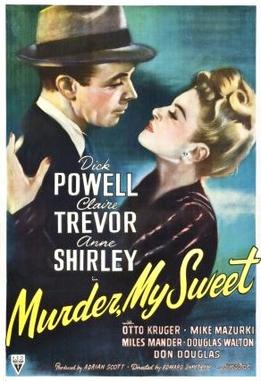
Murder, My Sweet is a 1944 American film noir, directed by Edward Dmytryk and starring Dick Powell, Claire Trevor and Anne Shirley. The film is based on Raymond Chandler's 1940 novel Farewell, My Lovely. It was the first film to feature Chandler's primary character, the hard-boiled private detective Philip Marlowe.
The Falcon is the nickname for two fictional detectives. Drexel Drake created Michael Waring, alias the Falcon, a freelance investigator and troubleshooter, in his 1936 novel, The Falcon's Prey. It was followed by two more novels – The Falcon Cuts In, 1937, and The Falcon Meets a Lady, 1938 – and a 1938 short story. Michael Arlen created Gay Stanhope Falcon in 1940. This Falcon made his first appearance in Arlen's short story "Gay Falcon", which was originally published in 1940 in Town & Country magazine. The story opens with the words "Now of this man who called himself Gay Falcon many tales are told, and this is one of them." Arlen's Falcon is characterized as a freelance adventurer and troubleshooter – a man who makes his living "keeping his mouth shut and engaging in dangerous enterprises."
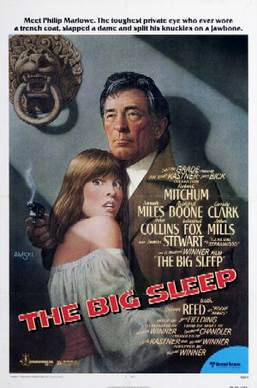
The Big Sleep is a 1978 neo-noir film, the second film version of Raymond Chandler's 1939 novel of the same name. The picture was directed by Michael Winner and stars Robert Mitchum in his second film portrayal of the detective Philip Marlowe. The cast includes Sarah Miles, Candy Clark, Joan Collins and Oliver Reed, and features James Stewart as General Sternwood.
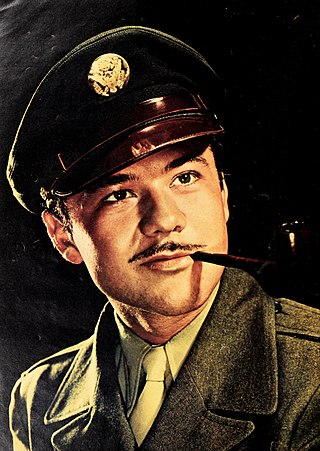
Turhan Bey was an Austrian-born actor of Turkish and Czech-Jewish origins. Active in Hollywood from 1941 to 1953, he was dubbed "The Turkish Delight" by his fans. After his return to Austria, he pursued careers as a photographer and stage director. Returning to Hollywood after a 40-year hiatus, he made several guest appearances in 1990s television series including SeaQuest DSV, Murder, She Wrote and Babylon 5 as well as a number of films. After retiring, he appeared in a number of documentaries, including a German-language documentary on his life.

Tom Conway was a British film, television, and radio actor remembered for playing detectives and psychiatrists, among other roles.
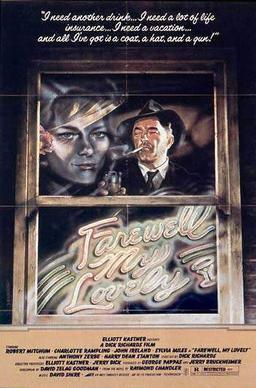
Farewell, My Lovely is a 1975 American neo-noir crime thriller film directed by Dick Richards and featuring Robert Mitchum as private detective Philip Marlowe. The picture is based on Raymond Chandler's novel Farewell, My Lovely (1940), which had previously been adapted for film as Murder, My Sweet in 1944. The supporting cast features Charlotte Rampling, John Ireland, Jack O'Halloran, Sylvia Miles, Harry Dean Stanton and hardcore crime novelist Jim Thompson, in his only acting role, as Charlotte Rampling's character's elderly husband Judge Grayle. Mitchum returned to the role of Marlowe three years later in the 1978 film The Big Sleep, making him the only actor to portray the character more than once in a feature film.

The Falcon's Brother is a 1942 American crime drama film in which George Sanders, who had been portraying "The Falcon" in a series of films, appears with his real-life brother Tom Conway; with Sanders handing off the series to Conway, who would play the new Falcon in nine subsequent films. Jane Randolph was featured in a supporting role. The Falcon's Brother, the only one to feature two Falcons, was directed by Stanley Logan.

The Gay Falcon is a 1941 American mystery thriller film directed by Irving Reis and starring George Sanders, Wendy Barrie and Allen Jenkins. A B film produced and distributed by RKO Pictures, it the first in a series of sixteen films about a suave detective nicknamed The Falcon. Intended to replace the earlier The Saint detective series, the first film took its title from the lead character, Gay Laurence. Sanders was cast in the title role; he had played The Saint in the prior RKO series. He was teamed again with Wendy Barrie who had been with him in three previous Saint films. The first four films starred Sanders as Gay Lawrence and the rest featured Tom Conway, Sanders' real-life brother, as Tom Lawrence, brother of Gay.

Time to Kill is an American mystery film directed by Herbert I. Leeds. It is the first screen adaptation of Raymond Chandler's novel The High Window, which was remade five years later as The Brasher Doubloon. The detective was changed from Philip Marlowe to Michael Shayne for this version, with Lloyd Nolan playing the part and Heather Angel in a rare turn as leading lady. It is also the final Michael Shayne film starring Lloyd Nolan made at Fox, who closed down their popular B movie unit which included Mr. Moto, Charlie Chan, and the Cisco Kid. In 1946 the series would be reborn at Producers Releasing Corporation with Hugh Beaumont taking over the role.
Mazaný Filip is a Czech comedy film released in 2003 and based on a stage play by Sklep Theatre.

The Falcon Strikes Back is a 1943 American crime film directed by Edward Dmytryk and stars Tom Conway as the title character, the amateur sleuth, the Falcon. Supporting roles are filled by Harriet Hilliard, Jane Randolph, Edgar Kennedy, with Cliff Edwards filling in for Allen Jenkins as the Falcon's sidekick, "Goldie" Locke. It is the fifth film in the Falcon series and the second for Conway, reprising the role that his brother, George Sanders had initiated.

The Falcon in Hollywood is a 1944 crime film directed by Gordon Douglas and stars Tom Conway in his recurring role as a suave amateur sleuth, supported by Barbara Hale, Jean Brooks, and Rita Corday. The film was the 10th of 16 in Falcon detective series.

A Date with the Falcon is the second in a series of 16 films about the suave detective nicknamed The Falcon. The 1942 sequel features many of the same characters as the first film, The Gay Falcon (1941).

The Falcon's Adventure is a 1946 American mystery film directed by William Berke and starring Tom Conway, Madge Meredith and Edward Brophy. It is the 13th of 16 films about the Falcon and the final film of RKO's Falcon series starring Conway. It was directed by William Berke, who had served as producer for the previous entry in the series, 1946's The Falcon's Alibi.

The Falcon in San Francisco is a 1945 American crime and mystery film directed by Joseph H. Lewis and stars Tom Conway, Rita Corday and Edward Brophy, who played the recurring role of "Goldie" Locke. The film was the 11th in The Falcon series of detective films, and the eighth featuring Conway as the amateur sleuth. The Falcon in San Francisco was the final film in the series produced by Maurice Geraghty, after which budgets were reduced and location shooting largely abandoned.
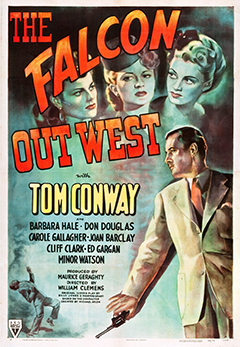
The Falcon Out West is a 1944 American mystery film directed by William Clemens and starring Tom Conway, Joan Barclay and Barbara Hale. The film was part of RKO's The Falcon series of detective films, this time, a murder set in Texas.

Search for Danger is a 1949 American crime film directed by Jack Bernhard and starring John Calvert, Albert Dekker and Myrna Dell. The film was the last of three made by the low-budget Film Classics company featuring Calvert as The Falcon who had previously been played by George Sanders and Tom Conway for RKO. The film's art direction was by Boris Leven.


















